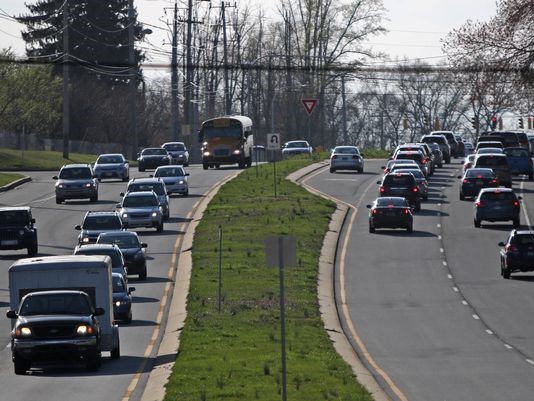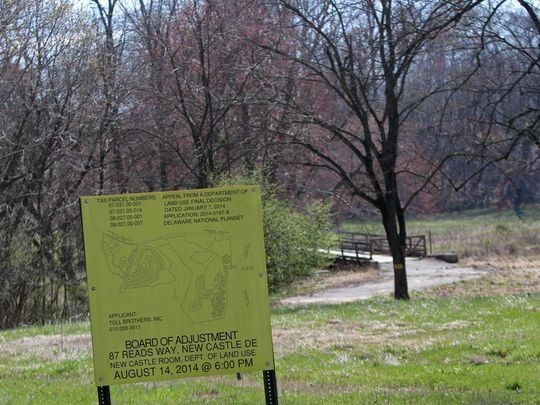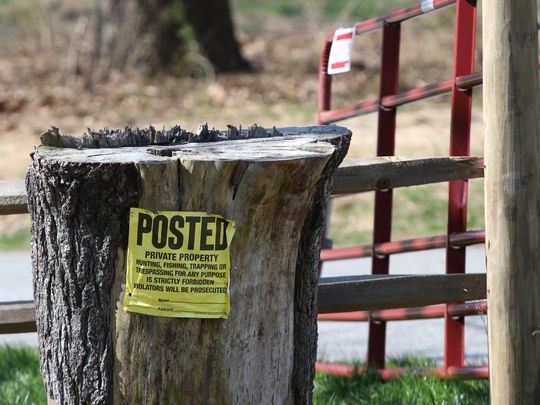Contact - Volunteer - Contribute - (302) 468-6024

|
||||||||||||||||||||||||||
| Bob Weiner News | ||||||||||||||||||||||||||
|
3/30/2016 Councilman Bob Weiner, who represents the area around the Hercules development, said the decision underscores that the county has the authority to make sure developments don’t overwhelm nearby traffic arteries. "This decision is significant because it reiterates county government's key role in protecting the community against traffic gridlock," he said. "This decision follows in the wake of the Barley Mill Plaza decision, which reminded county government that traffic data is always relevant to the decision-makers." Ruling affirms New Castle County power to block sprawl; A Superior Court judge has upheld a controversial New Castle County traffic rule Xerxes Wilson, The News Journal 8:41 p.m. EDT March 30, 2016  Story Highlights • A judge has ruled in a plan to develop the former Hercules Country Club in Mill Creek. • The course was developed in the 1930s, and a home-builder wanted to construct residences on the property. • Land Use Department rules are meant to limit traffic congestion by gauging the effect of a proposed development on nearby roadways. A Superior Court ruling affirms New Castle County's power to block a housing or commercial development if builders refuse to fund road improvements for alleviating added traffic. The case, involving the former Hercules Country Club in Mill Creek, comes as traffic regulations have been under scrutiny by developers who feel the rules in unincorporated county areas unfairly burden proposals with the cost of fixing traffic congestion decades in the making. "This sets a pretty good rule that we will certainly be relying on going on in the future," said County Executive Thomas P. Gordon. "More importantly, anyone who is challenging the rules will have to look at this," The Hercules case dates back six years, when Horsham, Pennsylvania, home-builder Toll Brothers Inc. proposed a 264-home development on 200-plus acres straddling Red Clay Creek near Lancaster Pike and Hercules Road. The course, which was founded by the chemical company Hercules Inc. in the 1930s, closed in 2010 and was then known as Delaware National Country Club. At the center of the lawsuit are county Land Use Department rules meant to limit traffic congestion by gauging the effect of a proposed development on nearby roadways. The impact is measured by how long it takes motorists to get through intersections.  Grounds of the former Delaware National Country Club at Lancaster Pike and Hercules Road are shown on Monday. A housing development on the site has produced a lengthy legal battle. (Photo: JENNIFER CORBETT/THE NEWS JOURNAL) If an intersection is deemed failing by traffic analysts, the county can’t approve a development nearby unless the builder agrees to make sometimes-expensive road improvements to improve flow. Measures typically include widening roadways, adding turn lanes and traffic signals, sometimes miles from the project. In Toll's case, Lancaster and Centerville Roads was failing even before projected traffic was factored in. The company proposed a $1.1 million solution that the Delaware Department of Transportation rejected. DelDOT outlined a $3.5 million fix and said Toll could contribute $1.1 million toward that solution. However, county officials later said the prescribed fixes wouldn’t do enough to stem congestion, and rejected the plan. The decision effectively killed the project. The county's Board of Adjustment upheld that rejection in 2014. Toll sued in 2015, arguing that DelDOT should be the final arbiter on traffic issues and the agency's endorsement of a larger fix should compel the county to approve the development. The court disagreed, saying precedence and law gives final authority to the county. "The possibility that DelDOT may someday modify the intersection does not permit the Department of Land Use to approve the” development, Superior Court Judge John C. Parkins Jr. in his opinion filed this week, which upheld the development's rejection. Neighbors cheered the ruling, but said they know more development will one day come to the course. “The land is too valuable. It is over $500,000-per-acre in our neck of the woods," said Peter Christy, a resident of nearby Little Falls Village and former head of the neighborhood's maintenance corporation. "They will now have to come back with a plan that is more in line with the Land Use Department's rules and regulations." A solution to traffic congestion? Toll's lawsuit echoed a longstanding complaint from the development community that some underused parcels are impossible to redevelopment because the traffic is already clogged from the existing population. Toll argued the development would only account for 1 percent of the congestion so immediately paying the $3.5 million cost of the fix DelDOT outlined was disproportionate. Toll also argued that because the intersection was already failing, the development wasn't driving it into failure and should be approved. But the law also states the county shall approve a project when "acceptable levels of service will be maintained," Parkins wrote. The court found the intent of these laws is not only to bar developments that create new congestion, but limit the increase of existing congestion. Sidney Liebesman, the private attorney representing New Castle County in Toll's lawsuit, said the court disagreed with Toll's argument. "This ruling reaffirms the authority of the Land Use Department with respect to dealing with traffic matters in new developments," he said. The decision reflects the long-standing dispute between the county and developers over what costly traffic-control measures should be added when new developments are proposed. Gordon has said addressing congestion a key part of his administration, and officials are in the middle of an extensive overhaul of the county Unified Development Code, which outlines where projects can be built and other standards, including impacts on traffic. Government watchdog groups see the traffic rules as an important way of ensuring new developments don't further snarl local roads. The business community in recent months has pressured Gordon to find a solution to traffic rules they see as unfair, and builders have said stifle redevelopment of unused parcels in densely populated northern parts of the county. Local land-use attorney Larry Tarabicos said the rules are hurting business growth. He has represented numerous projects, including a contentious plan to build a CVS pharmacy at Paper Mill and Corner Ketch roads in Pike Creek that angered neighbors. "Do I think the standards are too strict and unfair? Yes. I think we need to measure traffic impact with every significant project, but this sort of outdated and silly level of service standard needs to be changed," he said. Snarling several projects Tarabicos said traffic congestion should be alleviated through developers paying fees based on the size of their building project. Those fees would then be cobbled together to fund road improvements concentrated on the system as a whole, not just individual intersections. The traffic rules have snarled several projects, the largest being a 1.6 million-square-foot mixed-use development planned at Barley Mill Plaza in Greenville, which touched off an intense battle with residents over traffic worries. The development later resulted in legal action against New Castle County and the project being shelved. (Coincidentally, Liebesman also represented the county in the case and John Tracey – an attorney for Toll Brothers in the Hercules matter – represented Barley Mill developer Keith Stoltz.) More recently, traffic regulations have impacted projects like the redevelopment of the former Avon distribution center on Del. 273 near Newark. Jerome S. Heisler Jr., executive manager of Bear developer Venture Group XVI, earlier this month told The News Journal he estimated improvements required by the county would cost at least $1 million. Government officials have speculated the same rules may present a hurdle for the development of the DuPont Country Club, which could be off-loaded as the chemical giant repositions during its merger with Dow Chemical Co. Many nearby intersections throughout the county, like Concord Pike and Naamans Road, are already failing and have limited nearby development. Gordon said the current standards may have flaws, but are still vital to protect residents. "You can't overlook if you have one intersection that fails, it can cause the entire intersection to fail," he said. “Do I think the standards are too strict and unfair? Yes. I think we need to measure traffic impact with every significant project, but this sort of outdated and silly level of service standard needs to be changed.” Larry Tarabicos, land use attorney Councilman Bob Weiner, who represents the area around the Hercules development, said the decision underscores that the county has the authority to make sure developments don’t overwhelm nearby traffic arteries. "This decision is significant because it reiterates county government's key role in protecting the community against traffic gridlock," he said. "This decision follows in the wake of the Barley Mill Plaza decision, which reminded county government that traffic data is always relevant to the decision-makers." Liebesman said the plaintiffs have 30 days to appeal the case to the Supreme Court. It is unclear if the Superior Court ruling will see further appeals, meaning development pressures that threaten other local golf courses could remain. Cavaliers County Club near Christiana Mall and Brandywine Country Club in Brandywine Hundred have both been targeted by developers in recent years. A developer seeking to building on the Three Little Bakers Country Club in Pike Creek is also tied up in litigation with the county . Kira Sterling, a spokeswoman for Toll Brothers, said the company is reviewing its options.  Private property signs on the grounds of the former Delaware National Country Club are shown Monday. A plan to develop housing on the site have been in legal limbo for years. (Photo: JENNIFER CORBETT/THE NEWS JOURNAL) In the four years since the project was put off, a new traffic signal and other road improvements have been installed nearby while other development projects have been added in the vicinity. It is unclear how road improvements since the start of the litigation will affect the prospects for development if Toll were to start a new development application. Christy, the resident, expects to see another plan. "It will eventually be developed,” he said. Contact Xerxes Wilson at (302) 324-2787 or xwilson@delawareonline.com. Follow @Ber_Xerxes on Twitter. Hercules Country Club • Opened in 1937 by Hercules Powder Co. • Swimming pool and tennis courts added in 1939 • Expanded in 1967 as membership hit 1,500 • Allowed non- Hercules employees to join in 1991 • Later known as Delaware National Country Club until closing • Toll Brothers in 2010 announced plans to build more than 200 homes on site • Judge ruled this month in protracted legal battle about project Source: Golf Association of Philadelphia Have news? Please contact me! |
Give Bob a "like" on Facebook: |
|||||||||||||||||||||||||
|
||||||||||||||||||||||||||
|
||||||||||||||||||||||||||
Paid for by Friends of Bob Weiner - www.BobWeiner.com - (302) 468-6024 - Volunteer - Contribute |
 Subscribe to RSS feed
Subscribe to RSS feed